How to Clean a Jute Rug (4 Step Guide)
-
Pete Ortiz
- Last updated:

When you want to make your home cozy and stylish, jute rugs are a durable and organic addition that’s a worthy investment. Also known as burlap or hessian, jute is a natural fiber spun and hand-woven into some of the softest rugs for home furnishing, luggage, and even clothing.
In its natural state, jute fiber features a gold shine that is soft, attractive, tough, and durable. The material is dyed to provide several attractive colors with different patterns and shapes for rugs and carpets. However, jute fibers become stained, mildewed, and discolored without proper cleaning and maintenance.
Since they’re prone to shedding and will ruin under normal cleaning processes, let’s explore how to clean a jute rug properly.
How Do You Clean Jute Rugs?
One of the most significant upsides of jute is also the reason it’s so challenging to clean, especially when you put water into the picture. The fibers are biodegradable and start to break down when in contact with moisture or other elements, decaying without leaving waste behind.
Due to the earthy texture of jute, its softness is attractive to pets and kids, for whom the natural material won’t cause skin irritation1. The crop doesn’t require pesticides and fertilizers, adding to its benefits for the environment, while the softness of its rugs doesn’t scratch hardwood floors.
As such, washing, steaming, or cleaning a jute rug with water isn’t applicable if you want the item to stay soft, attractive, and last long.
So how do you clean a jute rug, seeing as water is the fiber’s number one enemy?
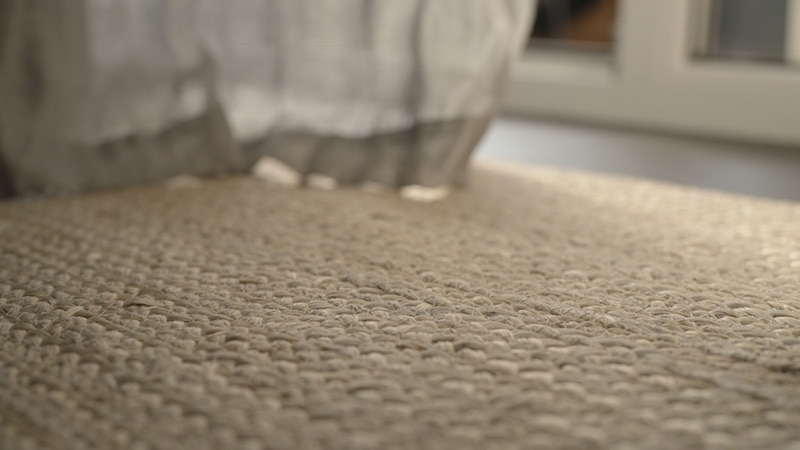
Before You Start: Items Needed
You’ll need a few items to perform the job properly, including:
- A vacuum cleaner: Vacuuming helps eliminate dust and trapped dirt and removes jute fiber shedding without the beater bar and following the weave.
- A soft cloth or microfiber towel: A wet cloth helps spot clean jute rugs with light dampening and wiping, protecting the fibers from excess moisture detrimental to your rug’s durability.
- Dry carpet cleaner: You won’t need much water, or none when using a dry carpet cleaner to remove stains from a jute rug.
- White vinegar: Mixing one part vinegar and another of water creates a solution that displaces moisture from your jute rug while cleaning dirt and stains
- Baking soda: This is a multipurpose rug cleaner for stubborn stains and maintains any dye or color pattern on the material.
- Mild soap: A gentle working soap such as dish detergent works well to spot clean and wipe out stains from jute rugs.
- Club soda: A small amount of club soda is acceptable for spot cleaning a jute rug, dabbed on a soft white cloth so there’s no color transfer.
- Soft bristle brush: For immediate cleaning without a vacuum cleaner, use a soft-bristled brush with a small amount of water to remove topical dust and dirt from your jute rug.
The 4 Steps to Cleaning a Jute Rug
There are a few approaches to cleaning your jute rug, depending on how dirty or stained the floor covering is and the rug’s color. Like other natural fibers, jute is an odor-retaining material, which is to be a primary focus if you have pets in your home.
Jute is also sensitive to moisture and will attract dampness, promoting mildew growth. As such, your cleaning regime for jute rugs must consider the amount of water to use, as too much leaves the rug browned.
Here are the most effective cleaning methods for jute rugs that don’t leave the material stained, wet, or brittle.
1. Spot Cleaning
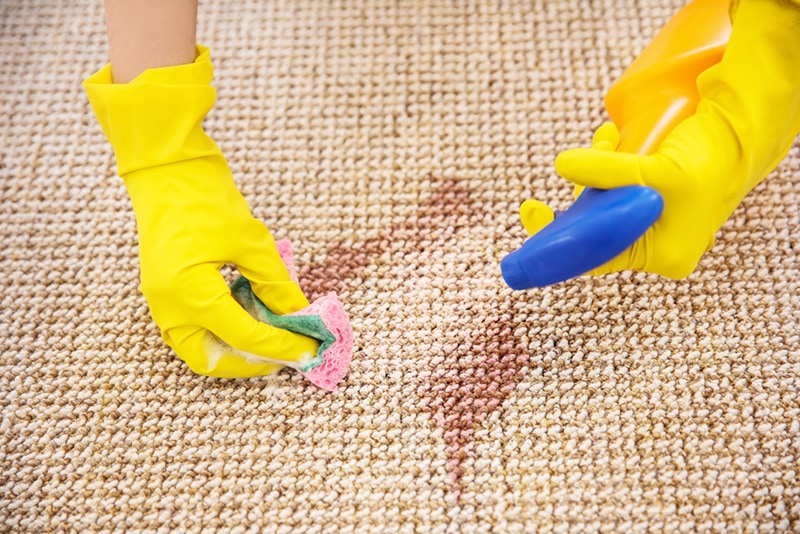
Jute rugs are spot-cleaned when you notice a stain on the fibers, which you should clean immediately to prevent setting. It’ll not be challenging to spot-clean this rug, and it will take approximately 25 minutes using club soda, dish soap, and a dry carpet cleaner spray.
You’ll also need a hair dryer or vacuum cleaner to remove any residual moisture. Follow these steps for effectiveness:
- Use a dull knife or wooden nail file to scrape off as much of the stain as possible, especially if there are caked-up residues on top.
- Blot the stain with a wet cloth dipped in club soda or dish soap to soften the stain, taking care to use white cloths that won’t transfer color to your off-white jute rug. Press onto the stain firmly, rub it in your cleaning solution, and prevent the staining from spreading.
- Use a dry carpet cleaner or club soda to treat the stain, and dilute with cold water.
- Work from the outside to blot the stain entirely, or spray your cleaner directly onto the stain.
- To avoid leaving moisture on your jute rug, use a hairdryer or vacuum cleaner to dry as much of the wetness as possible. Use warm or cool settings to avoid damaging the rug’s fibers.
2. Regular Vacuuming
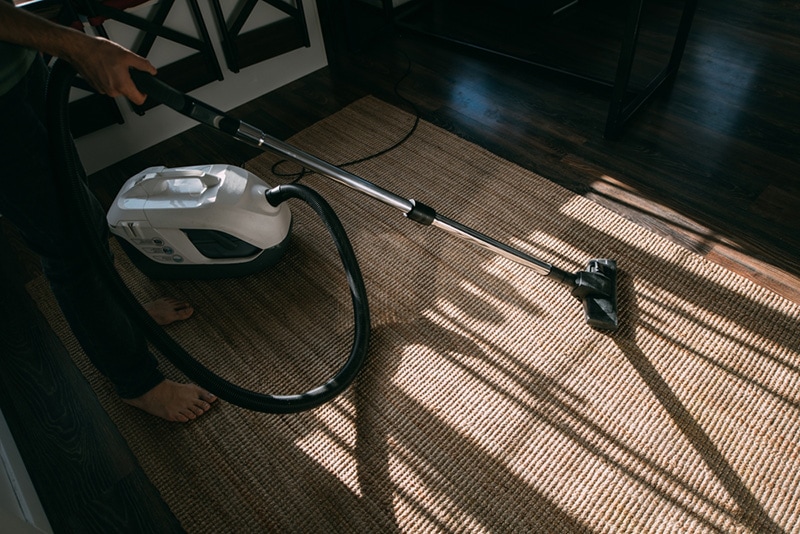
Vacuum cleaning is essential for properly maintaining your jute rug, and you should do this regularly or immediately if you notice dirt or dust. That’s so you can avoid grinding stains into the fibers as you step on the rug by staying on a vacuuming routine.
It’s easy to vacuum a jute rug without damaging the fibers, and it’ll take less than 10 minutes, depending on the rug’s size. Use a soft brush attachment or nozzle instead of the carpet cleaning beater bar on your vacuuming machine and follow these steps:
- Turn on your vacuum cleaner on its lowest suction settings and move the nozzle in different directions over your jute rug. Use all angles, considering which side the fibers are woven, and vacuum vertically and horizontally.
- Use a soft brush to clean the edges of your jute rug, taking care not to damage the binding fibers, and then turn it over to vacuum the back side. You must also sweep beneath the rug since jute is porous and notorious for shedding, so debris and dirt often fall through.
3. Using a Carpet Cleaner
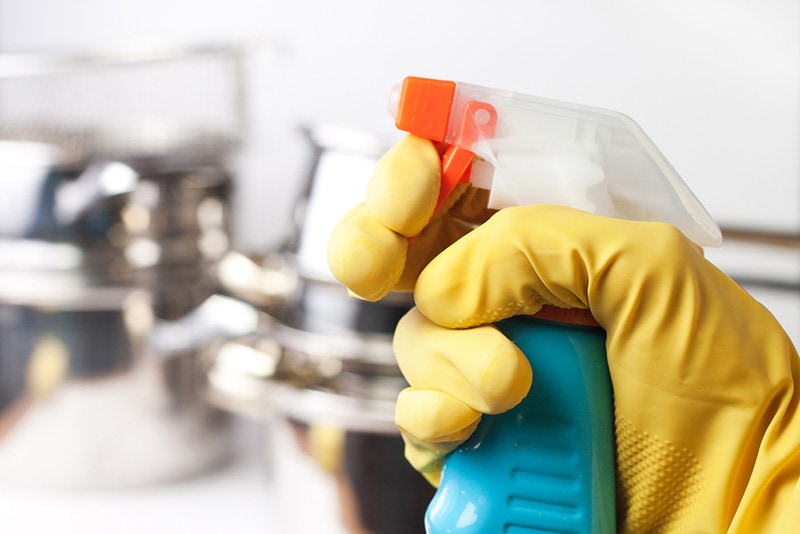
You can deep clean your jute rug using the carpet cleaner of your choice, but avoid any that contains bleach or stain-removing solid chemicals. A dry carpet cleaner, the type you spray on, is the best for cleaning the jute fibers, and you can test it initially on a small inconspicuous portion.
It’ll take you at least an hour and a half to deep clean your jute rug with a carpet cleaner, and in terms of difficulty, it’s easy. You’ll also need a vacuum cleaner and a stiff-bristled brush, along with some cloth. Follow the cleaning steps below:
- Vacuum your jute rug before applying the carpet cleaner to remove dust, dirt, and debris, except if there’s a wet spill.
- Apply the cleaner, whether it’s a spray, powder, or cream solution, ensuring that all portions of your jute rug are covered. Use the stiff-bristled brush to work the cleaner into the rug’s fibers and then leave it to sit for the specified time according to the manufacturer’s instructions.
- If you’ve used a spray or cream carpet cleaner, use a wet cloth that’s wrung out completely to remove any residues or stains lifted from your jute rug. Vacuum clean the rug if you used a powdered solution, and brush off the edges before rolling it over to suck out the underside.
4. Using Baking Soda
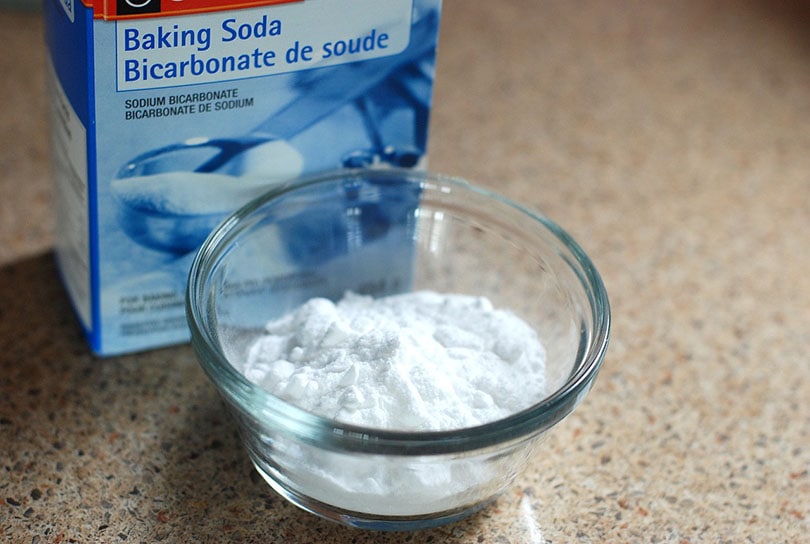
Sodium bicarbonate or ordinary baking soda is effective for cleaning jute rugs, similar to how a powder carpet cleaner does. Still, it’s a lot cheaper and readily available. You’ll need at least 15 minutes, including more than two hours of waiting time, and it’s easy in terms of difficulty.
Like cleaning a jute rug with carpet cleaners, you’ll need a vacuum cleaner, cloth, and a table or stack of heavy books. Initially, you’ll start with vacuum cleaning the rug unless you have a wet spill, and then;
- Sprinkle a light layer of baking soda generously on your jute rug and leave it to sit for at least two hours or more, depending on the dirt situation. That’s so the sodium bicarbonate can absorb stains, odor, and oils and use an extra amount on areas with stubborn staining.
- Cover the rug with cloth and stack a pile of heavy books or an upended table onto your jute rug to help absorb baking powder.
- Once the baking powder is adequately absorbed, vacuum the jute rug to remove all residues, or take it outside and shake it well.
What Are the Upsides of Having Jute as a Rug?
Jute is now the trend for natural fiber carpets and rugs, a type of fiber derived from the jute plant. It’s known as the golden fiber and is sought-after for its smoothness, softness, and natural golden shine.
The jute plant’s central part is woody and cut down to release fibers composed of lignin and cellulose. The resultant Jute yarn is woven into characteristically durable, soft, and colorful rugs when dyed and patterned.
The neutral coloring and natural woven fibers of jute rugs make the perfect base for your room décor.
Jute, a type of burlap, is abundantly produced and affordable compared to cotton, the only natural fiber surpassing it in production. Rugs made from jute will take any décor setting to a new level due to their stylishness and all-natural durability. The fibers are beautifully textured, and besides softness, their eco-friendliness and aesthetics make its rugs a beneficial addition to your home’s décor.
Conclusion
Jute rugs are a quintessential trend catching on due to their underfoot softness, natural toxic-free fibers, and durability. They’re also great at improving the décor aesthetics of any space, and with the proper care or maintenance, they keep their color and bright patterns attractive.
You’ll need to vacuum your jute rug weekly or twice a week and use a fabric protector to keep the fibers from attracting dust and stains. Always clean underneath the rug where debris has fallen through, and keep the humidity around the rug to a minimum.
- What Is the Jute Plant and How Is It Processed Into Jute Yarn for Rugs?
- Are Jute Rugs Organic and Eco-Friendly?
- Is Jute Yarn Nontoxic or Does a Jute Rug Cause Allergic Reactions?
- How to Remove Stains and Congealed Dirt from Jute Rugs
- Why Does My Jute Rug Retain Odors?
- What’s the Right Way to Clean a Jute Rug without Moisture?
- Using a Vacuum Cleaner for the Proper Maintenance of a Jute Rug
- How to Test the Right Cleaning Solution for a Jute Rug
- Choosing the Right Carpet Cleaner for Jute Rugs
- Can I Use Baking Soda to Remove Stains From a Jute Rug?
- https://www.livingetc.com/advice/how-to-clean-jute-rugs
Featured Image Credit: Design gallery01, Shutterstock
Contents


